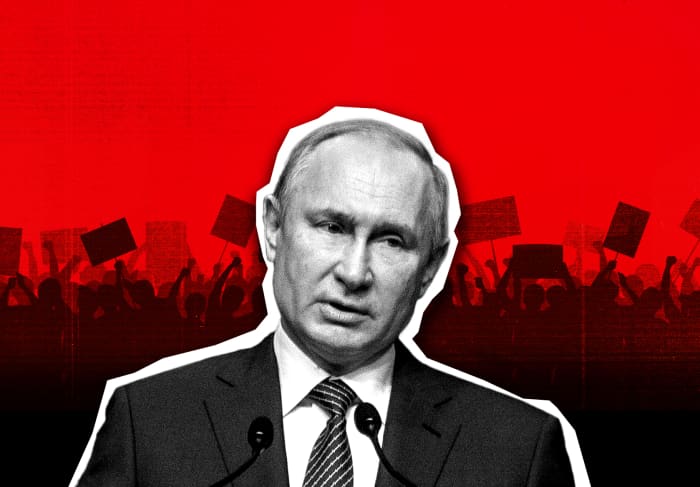MarketWatch
After years of living in Moscow, I have bad news: No one should expect the Russian people to suddenly rise up against Putin now
By Lukas I. Alperto – March 8, 2022
Years of state-controlled media, stifled dissent and increases in standards of living have bred an almost impenetrable political complacency.

In late 2011, tens of thousands of Russians took to the streets of Moscow to demand that election results rife with alleged fraud be overturned.
It was the biggest challenge to Vladimir Putin’s authority since he took power a decade earlier, and that it wasn’t immediately crushed gave hope that perhaps change was coming to Russia.
“There has been a phase shift — like water starting to boil — anything is possible from here,” one protestor told me at the time. It was a level of optimism that has not been seen since.
As Russia wages war in Ukraine and deals with crippling economic sanctions that have crushed the ruble, sent prices soaring, and shredded its citizens’ savings, street protests have begun anew, but it is hard to imagine public outcry strong enough to shake the Putin regime.
Over the past decade, the Kremlin has systematically hounded whatever vestiges of the protest movement into silence. Many of its organizers now live abroad. Its most well-known figure, Alexei Navalny, has been jailed.
For the rest of the country, years of increasingly monolithic messaging through state media has further undermined whatever resistance might take root.
The Russian population has been lulled into a deep political sleep under Putin after being bombarded for years by such lies and misinformation on TV, following decades of a similar approach under Soviet rule. Why bother being engaged if you don’t know what to believe?
Many are convinced that Russia is simply trying to dislodge Nazis who have taken power in Kyiv and that Ukrainian people are welcoming Russian soldiers with open arms. Nowhere to be seen on state-controlled television are images of Ukrainian housing blocks blasted to dust and fleeing civilians killed by indiscriminate Russian shelling.
What little independent media remained has been entirely shut down under new rules from the Kremlin vowing to harshly punish any news outlet that deviated from the official line. Even foreign media has been forced to curtail operations so as not to run afoul of the new rules,
Average Russians have also seen their standard of living improve under Putin following the turbulent 1990s when Russia was recovering from the collapse of the Soviet Union. Wages have risen. Average people can afford foreign cars and annual holidays to the beaches in Greece and Egypt. For years, many had little interest in rocking the boat.
And the brutal stifling of all dissent has driven home to many that there is little upside to being politically engaged, unless you were fully for Putin. As a matter of survival, it was better to just keep your mouth shut.
The oligarchs don’t pick their leader, Putin picks who his oligarchs are. They have limited influence, so a palace coup from the business class seems unlikely.
It is difficult to imagine Russia’s sudden global pariah status and the collapse of the economy quickly changing this dynamic.
The other theory is that sanctions will cause such deep economic pain to the country’s oligarchs, who are seeing their yachts and overseas villas being seized, that they will rise up and push Putin into changing course.
But that betrays a fundamental misunderstanding of Russia’s power dynamics — the oligarchs don’t pick their leader, Putin picks who his oligarchs are. They have limited influence, so a palace coup from the business class seems unlikely.
Putin’s power lies with the country’s all powerful intelligence agencies, defense complex and police force, none of which he is likely to lose anytime soon.
Perhaps sanctions and the threat of global war will rouse long dormant forces in Russia, but it seems unlikely that that will happen swiftly.
Lukas I. Alpert is a financial crimes reporter for MarketWatch, and a former Moscow correspondent for The Wall Street Journal.
